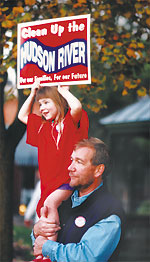|
The Sierra Club enters the Bush era running on all cylinders.
By Robbie Cox
Sierra Club President
 Like
the feel of electricity before a storm, there's tension in the air
as a new Congress and administration take office. Not since President
Dwight Eisenhower worked with Republican majorities in the House and
Senate has the nation faced a Republican lock on all three branches
of government. With wide support in the land for environmental protection,
however, President-elect George W. Bush ignores the environment at
his peril. Like
the feel of electricity before a storm, there's tension in the air
as a new Congress and administration take office. Not since President
Dwight Eisenhower worked with Republican majorities in the House and
Senate has the nation faced a Republican lock on all three branches
of government. With wide support in the land for environmental protection,
however, President-elect George W. Bush ignores the environment at
his peril.
The Sierra Club arrives at this crossroads stronger and better prepared than at any time in our 108-year history, our muscles toned by six years of battle with a hostile leadership in Congress. Club activists and staff have developed powerful new tools, cultivated new allies and demonstrated we can and will hold our political leaders accountable.
We've been here before - in 1995-96, we stopped Newt Gingrich and company when they tried to gut the Clean Water Act, weaken protections for endangered species and reverse 25 years of environmental progress.
In response, the Sierra Club organized the largest, most sustained grassroots accountability campaign in our history. We committed new resources to local organizing in hundreds of communities, redesigned old tools and developed new ones (like The Planet, daily action alerts, our Web site) to better communicate with our members. We launched the Sierra Club Training Academy, empowering thousands of activists.
But the Club that stopped the 104th Congress' "war on the environment" was not as strong as it is today. Then, we were stung by budget deficits and undergoing a major restructuring of our operations. By contrast, John Muir's Sierra Club today is running on all cylinders, emboldened by recent victories, such as: the naming of 11 new national monuments (and still counting); the dramatic strengthening of the Forest Service's final wild forest protection plan, which will halt roadbuilding and commercial logging in roadless areas, including Alaska's Tongass National Forest; stronger legal tools to protect our air and water; and an elevated national debate over the importance of "smart choices" to combat sprawl.
Similarly, the Club achieved its top electoral goals in races for the U.S. House and Senate in November 2000, with 75 percent of our endorsed candidates winning. Of special importance was the defeat of Washington's environmental grinch, Sen. Slade Gorton (R).
Along the way, the Sierra Club earned respect from our adversaries and the media alike as we moved from the chorus of our nation's political drama to one of its principal actors. Where we invested resources in getting out our message - particularly in states such as Michigan, Washington, Oregon, Kansas, Illinois, Minnesota, Missouri, New Jersey and New York - the public understood the difference between candidates' positions on the environment.
As I traveled the country in the months before the 2000 election, I was struck again and again by the raw talent and the commitment of our members. The Mackinac (Michigan) Chapter publicized Sen. Spencer Abraham's (R) poor record by handing out Abraham "trading cards" at baseball games. Kansas volunteers turned out on a cold weekend to distribute voter guides.
Club activists in Illinois organized a solidarity rally with labor unions. And, in 11 states, dozens of different volunteers and staff put on the "Tommy the Toxic Waste Drum" costumes to bird-dog Bush and remind the public of his poor environmental record in Texas.
In Minnesota, the North Star Chapter's creative "Toxic Twelve" campaign targeted entrenched anti-environmental incumbents in the state legislature. Club volunteers in New Jersey poured into Rep. Rush Holt's (D) campaign to help re-elect an environmental champion in one of the nation's closest races.
The Sierra Club's mission is clear: to secure the highest level of protection possible for our wild lands and forests, and for the health of human communities. We shall continue to advance our priority campaigns: protecting wildlands, halting commercial logging on federal lands, promoting smart growth over sprawl, preventing concentrated animal feeding operations from polluting our waterways - and our international programs: stabilizing population, curbing global warming, promoting fair trade and protecting the human rights of environmental defenders.
We will also continue to stand ever vigilant against middle-of-the-night legislative "riders" and sneak attacks on environmental law.
American people care passionately about their environment. Our challenge is to enable our neighbors, co-workers and the public to take the next step: to go from caring about the environment to taking personal responsibility for protecting it, then taking action. The Sierra Club is the consummate vehicle for individuals who want to join together to make a difference. With your help, we can turn the broad current of support in our land into a loud megaphone for the environment.
Photo credits:
River Bottoms and Mountain Tops: Dad's shoulders were the perfect
perch for Katie Ballantyne, whose message was made loud and clear
at a rally held in Saratoga Springs, N.Y., in October. Katie's dad
is Chris Ballantyne, director of the Sierra Club's Northeast Field
Office, who wants General Electric to clean up PCB-contamination released
into the river from several power plants.
Up to Top
|